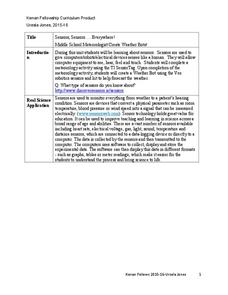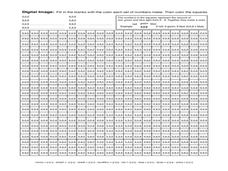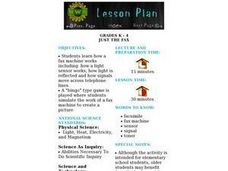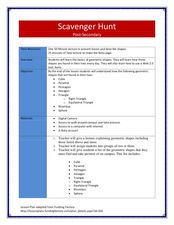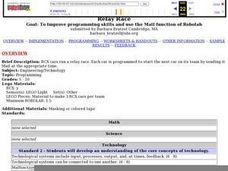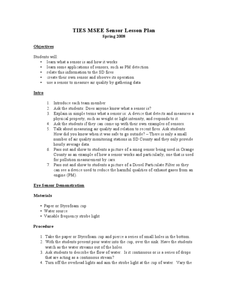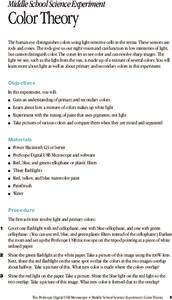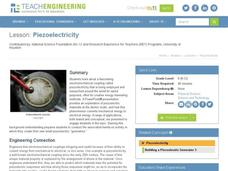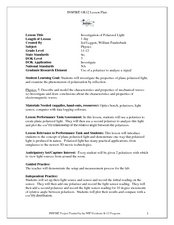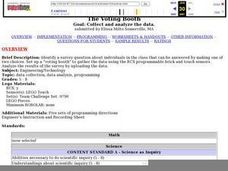Curated OER
Dependence of Light Intensity on Distance
Hopefully you have a sensor interface for your physics class to use with graphing calculators when collecting data with a light sensor. If so, read on. Use this resource for learners to predict and then test whether or not the intensity...
Kenan Fellows
Saving Those Who Save Us: Exploring the Use of Sensors with Data Visualization
Sensor technology is amazingly accurate and useful. Combining the sensor technology and mathematical knowledge, scholars design experiments to answer a question they have developed. Questions may focus on light sensing, temperature...
Curated OER
Reflection and Absorption of Light
Students use a microcomputer connected to a light sensor and temperature probe to explore the reflection and absorption of radiation for different surfaces. Students follow instructions in this guided inquiry based lab and are then asked...
Curated OER
science: Light Up the Ocean
young scholars investigate light levels under the ocean by conducting several simulations. After creating solutions representing seawater, they shine a light sensor on it to discover how light diffuses and is absorbed by the impurities...
Kenan Fellows
Evaluating Sensors and the Impacts of Physiological Stress: Designing a Wearable Device for Rescue Workers
A long-term project has scholars consider ways in which sensors help monitor physiological stress levels of rescue workers. They design and create a portable device for this purpose. Techies to the rescue!
Curated OER
Engineering: Lego Cars and Light Sensors
Young scholars build Lego cars with attached light sensors. They program the car to enter a tunnel and reverse out when it records a darker light reading.
Curated OER
Understanding Light: Lesson 2 - The Electromagnetic Spectrum
Students investigate the Electromagnetic Spectrum and realize there is energy beyond visible light. They identify parts of the EM Spectrum.
Curated OER
Introduction to Light Sensors
Young scholars work together to analyze the information from a light sensor. They develop their own hypothesis and analyze the data they have collected. They answer discussion questions to end the lesson.
Curated OER
An Introduction to Sensors
Students list as many examples as they can of sensors in their homes and/or automobiles, define sensor and discuss what qualifies devices as sensors, explore human eyes as sensors while watching teacher demonstration, recognize that...
Teach Engineering
How Effective is Your Sunscreen?
Protect skin from UV radiation! Groups design and conduct an experiment to test the effectiveness of UV safety products. The groups collect the data from the experiment and prepare a lab report. In the second day of the activity,...
Kenan Fellows
Sensors, Sensors…..Everywhere! Middle School Meteorologist Create Weather Bots!
My forecast is that you'll want to use the resource. Pupils design and create a weather bot as part of a project-based unit. These bots should be able to measure temperature, humidity, barometric pressure, wind speed and direction, and...
Curated OER
Imagers: The Adventure of Echo the Bat Number to Pictures: How Satellite Images are Created
Students examine the three primary colors of light and design a numerical code to represent those colors. They tell how satellites use numbers to create satellite images after completing a number of experimental activities.
Curated OER
Just The Fax
Students discover how a fax machine works including: how a light sensor works, how light is reflected and how signals move across telephone lines. A "bingo" type game is played where students simulate the work of a fax machine to create...
Curated OER
Scavenger Hunt
Students collect data about lighting conditions around a room using a light sensor and RCX. They use software to upload and analyze the data in order to draw conclusions about light intensity in the room.
Curated OER
Relay Race
Young scholars program RCX cars to relay information to one another via Mail when triggered by light sensors. The light sensors are appropriately spaced to allow for timed triggers.
Curated OER
TIES MSEE Sensor Lesson Plan
Students explain how a sensor works. In this technology lesson, students determine the air quality around their school. They record observations and share results to class.
Curated OER
Color Theory
Learners are able to gain an understanding of primary and secondary colors. They are able to explore about how a mixture of colors makes up white light. Students are able to experiment with the mixing of paint that uses pigments, not...
Cornell University
Nano What?
The size of a nanoparticle is difficult for pupils to grasp. A hands-on experiment is designed to give your classes perspective. Learners analyze different sports drinks for the content of electrolytes as an introduction to nanoscale....
Teach Engineering
Piezoelectricity
What effect makes children's shoes light up? Answer: Piezoelectric effect. Here is a PowerPoint presentation that describes piezoelectric materials as being able to convert mechanical energy to electrical energy. Individuals learn how...
Curated OER
Investigation of Polarized Light
Pupils investigate how polorizers filter light. In this physics instructional activity, students record their data and plot their results using a computer logging software. They discuss practical applications of polarization.
Curated OER
The Light Inside the Tunnel
Students work to improve their programming skills by programming model cars to drive through a tunnel, turn on its headlights and then extinguish the lights as the car exits the tunnel.
Curated OER
Comparing Sunscreens
Twelfth graders use a microcomputer connected to an ultra-violet sensor to compare the relative blocking power of different SPF sunscreens for the UVB region of the solar spectrum.
Curated OER
Radiation Budget
Students examine the radiation budget and the launching of the Budget Satellite. They role-play as designers of the satellite and construct one with a power source, instruments, and sensors. they explain how their satellite functions...
Curated OER
The Voting Booth
Pupils construct a "voting booth" to gather data using RCX programmable brick and touch sensors. They identify a survey question, construct the booth, and analyze the results by uploading data.










